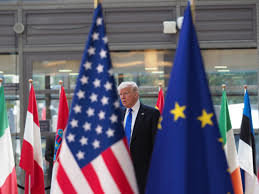
U.S.-adopted tactics to contain EU as ‘regionalism model’

By Payman Yazdani
Long standing conflicts in Europe which resulted in the Europeans
weakness is one of the key reasons that paved the way for the U.S. political,
economic and military rise as a global power and its domination on Europe.
After the World War II during the Cold War, economic and military weakness of
the Europeans and common goals like containing the former Soviet Union led to
increasing economic, political, cultural and security transatlantic cooperation
and partnership.
Besides transatlantic cooperation, Europeans tendency to avoid another possible
conflict in Europe resulted in further inter-European cooperation despite many
differences. Following the collapse of the Soviet Union and end of Cold War,
inter-European cooperation accelerated and entered a new phase. Finally
increased social, economic and political cooperation resulted in formation of
the European Union (EU) which for the first time let Europeans to adopt a
unified integrated foreign policy.
Despite the EU weaknesses in the field of security and its dependence on the
U.S. for its security the Union in two decades managed to be the best model of
regionalism and turn into an economic superpower.
According to World Bank figures in 2017, representing 24.3 percent of the global
economy the United States is still the largest in the world and respectively the
EU and China are the second and third biggest economies of the world
representing 21.37 and 14.8 percent of the world economy. A report by Forbes on
February 29th in 2016 indicates gradual decline of the U.S. economic hegemony
and domination on world economy over the past 4 decades. Since 1960 to 1964 the
U.S. represented 40 percent of the world economy but in 2014 following the rise
of the EU and China economies the U.S. just represented 22 percent of the world
economy.
The rise of the EU as an economic power as a serious rival of the U.S. and in
addition, some tendencies inside the EU member states to gain more military and
security independence from the U.S. is not something that can be ignored by
Washington.
Recent global developments in the world and Europe has made the Americans to
make efforts to change the post-World War self-created regimes and orders that
no longer serve the Washington interests. Many believe that Donald Trump is the
result of political engineering of the U.S. establishment to this end. In fact,
the process of containing the EU and changing self-created old orders and
regimes to guarantee the U.S. global economic, military and political hegemony
started when then U.S. President Georg W Bush divide Europe into old and new
Europe. Later Barak Obama followed the same policy softly and paved the way for
Donald Trump who is bold enough to follow the policy without respecting
international law, norms and curtsy.
Washington has adopted the following tactics over the past couple of years to
contain the EU as its rival and maintain its military and economic domination on
the Union:
- Creating more tensions between the EU and Russia and imposing more and more
sanctions against Russia to push Moscow out of EU energy market which will mean
more EU economic dependence on Washington.
- Intensifying tensions between the Europe and Russia in East Europe to maintain
Washington’s military presence in the continent to guarantee its military
hegemony and continuation of arm sale.
- Supporting the UK exit from the EU to reduce the EU’s military and global
economic weight. The UK exit from the Union as a country representing one sixth
of the EU economy, enjoying veto power in the UNSC and nuclear weapons means a
serious blow to the EU’s global economic, political and economic stances to the
benefit of the U.S.
- Withdraw from Paris Climate treaty and triggering trade war with the EU
contrary to international law and WTO regulations which aim to impose
Washington’s political and economic will on the Union and at the same time to
create differences among the Union member states.
- Prolonging crises intentionally in the EU neighboring regions like Syria and
Libya which has created a lot of economic, political and social problems for the
EU member states and gaps among them.
Pondering the U.S. approach toward the EU shows that the policy and tactics
adapted by Washington toward developments in East Europe, Ukraine, imposing
sanctions against Russia, crises in Syria and Libya resulting millions of
refuges, withdrawing from some international treaties like Iran’s Nuclear Deal
and triggering a trade war is after two main aims:
-Sending a message to the world that even the EU as the most successful model of
regionalism is not able to challenge Washington and finally has to give up to
the U.S. will.
-Deepening existing differences and creating new gaps and differences among the
Europeans by adopting the approaches which finally will indirectly and softly
help the re-rise of the rightists in Europe, the main factor as I mentioned
above for the rise of the U.S. as an economic and military power at the
beginning of the 20th century.
Source: Tehran Times















